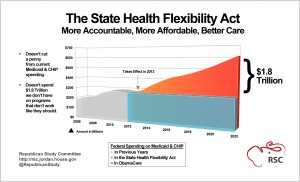Last year, I narrated a CF&P video making the case for Medicaid reform. The proposal is very simple: Replicate the success of the welfare reform of the 1990s by block granting the program and giving states full autonomy to figure out how best to provide health care to low-income people.
Medicaid reform is critical to save the nation from Greek-style fiscal collapse, especially if it is part of a comprehensive modernization of entitlement programs, and I was very impressed that the House of Representatives actually adopted a version of this reform last year as part of the Ryan budget.
But with the Senate refusing to enact a budget and Obama opposed to reform, the proposal languished.
In this case, though, languish is not the same as die. Led by Congressman Rokita of Indiana, reformers on Capitol Hill have introduced a new proposal to block grant Medicaid. 
As you can see from the chart they prepared (click to enlarge), the proposal will cap outlays for the block grant at the current level of Medicaid spending. This policy will save $1.8 trillion over the next 10 years, when compared to leaving the program on autopilot.
Writing about the proposal, Emily Miller of the Washington Times opined.
At the state level, Medicaid is the biggest expenditure, growing at a faster pace than even Medicare. Making matters worse, Obamacare mandates will increase the Medicaid rolls by an estimated 17 million to 25 million people. In order to give states flexibility to deal with this, the House rank-and-file GOP would eliminate the one-size-fits-all mandates for the federal funds. This also would provide better care.
The Washington Examiner also is impressed by the new proposal.
Medicaid represents a federal mandate that forces state governments to shoulder as much as half of the program’s annual costs but allows them virtually no say in how it is run. Even if Washington permitted the states some flexibility, there is little incentive for them to figure out more efficient ways to operate Medicaid, since the federal subsidy is paid with only incidental concern about performance. And thanks to Obamacare, unless Medicaid is reformed before 2014, the burdens it imposes on the states will only grow more severe. That’s when Obamacare requires state governments to spend an estimated $118 billion more of their own money in order to extend Medicaid coverage to an additional 17 million to 25 million people. Four House Republicans want to change all of that by converting the federal government’s share of Medicaid and Children’s Health Insurance Program funding into a single block grant with none of the strings that now prevent state officials from improving the way the program is managed.
These are all good points. The bottom line is that failure to reform entitlements guarantees that politicians eventually will impose a value-added tax. Or they’ll push red ink to unsustainable levels. Actually, based on what’s happened in Europe, where higher taxes simply meant higher spending and more debt, we’ll get both.
Simply stated, Medicaid reform is good health policy and good fiscal policy.
